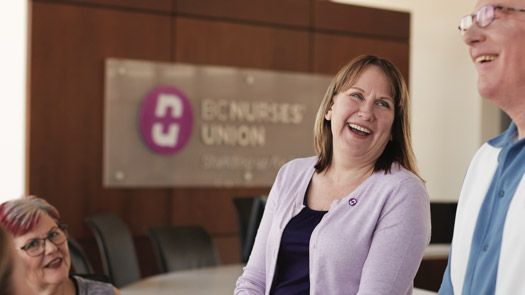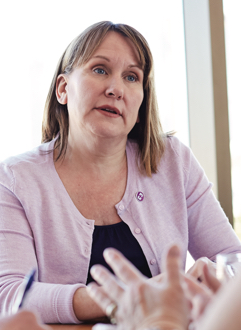Modelling the way
The pride that Tracey Jonker shows when talking about her union and the work it does is unmistakable.
 It’s matched only by her compassion for the younger nurses she works with.
It’s matched only by her compassion for the younger nurses she works with.
“I want things to change for new nurses who are coming out of school,” she states. “After I retire I want younger people to have a safe place to work with the proper equipment, the proper staffing – all of it. I want something better for the new kids.”
Jonker works on the medicine unit at Prince George’s University Hospital of Northern BC. She moved to the northern city from the lower mainland with her young family 25 years ago. At the time, she confesses, she wasn’t sure if she wanted to stay. But Prince George has grown on her and now she couldn’t imagine living anywhere else. Enticing new families to put down roots in the community is an ongoing challenge for health employers. Harsher weather, long distances between communities, and limited amenities can affect the willingness of nurses and other health-care workers to move to rural and remote areas of northern BC or prompt them to leave after a short while.
 And within the health-care system, the challenges staff face are only magnified in the north, be it short-staffing, endemic overcapacity, shortages of specialty educated nurses or chronic health and safety risks.
And within the health-care system, the challenges staff face are only magnified in the north, be it short-staffing, endemic overcapacity, shortages of specialty educated nurses or chronic health and safety risks.
For Jonker, that’s all the more reason to fight for working and practice conditions that will keep nurses living in her region. She has practised as an LPN for the past 15 years but didn’t become active in the union until she signed up to support BCNU’s Nurse+Nurse campaign that successfully united health-authority employed LPNs with RNs and RPNs in 2012.
“I was passionate about the Nurse+Nurse campaign,” recalls Jonker. “I went to facilities around my area and stood outside and talked to nurses about the benefits of being united with other nurses in one, powerful union. I even walked a facility on a night shift to share my passion, it was so important to me.”
Some of this passion came from witnessing how powerful a truly effective union can be.
“We had a bullying situation that was affecting all staff,” she says. “It was hell.” Jonker was impressed by the way BCNU representatives addressed the problem by meeting with all staff – not just BCNU members – and preparing a list of issues. Jonker’s participation helped BCNU bring forward a third party investigation that resulted in restoration of the workplace and an apology letter from the CEO. “I knew I wanted to be a BCNU member after that,” she says.
Jonker became a steward soon after joining BCNU. She then ran and was elected to the union’s North East region executive in 2017. Today, her elected work takes up much of her after-work time.
“I love being on my executive team and I’m passionate about my role as our region’s lobby coordinator,” she says. “I enjoy meeting politicians, telling them what we need and working collaboratively for the benefit of everyone – patients and health-care workers.
“Nurse recruitment and retention is the number one issue,” she says when asked what she discusses with MLAs. “It’s a huge problem. There are so many empty lines up here.”
Jonker says she’s built trusting relationships with her local MP, MLAs and mayors in her northern region. “I reach out to my MLA on a regular basis and can call her in an emergency,” she notes. “And I’ll continue reaching out to those politicians who don’t respond because nurses’ issues are not going away – health care is non-partisan and belongs to us all.”
Jonker also makes it her practice to educate patients and encourage them to bring their concerns to politicians.
“Nurses can advocate for change, but if the public does not get on board and start speaking it will be that much harder to achieve our goals.”
As a steward, encouraging and inspiring others to act is a daily mission for Jonker. She does this through example and by reminding co-workers about the power of their collective agreement.
“My schedule is a disaster when it comes to short calls,” she says. “I have filed grievances and have successfully gotten people paid for not being called while units are working short.” She says all members should make staffing inquiries about anything they may be questioning.
“I have taken on reporting hallway patients and the many hazards this practice creates, and I encourage all members to report also.” She reminds all members that they need to call the Workplace Health Call Centre and not ignore problems are solvable.
“We can make the change together – I’ve seen it happen!”
“Just knowing we can effect change for a better future keeps me going – the young ones deserve better.”